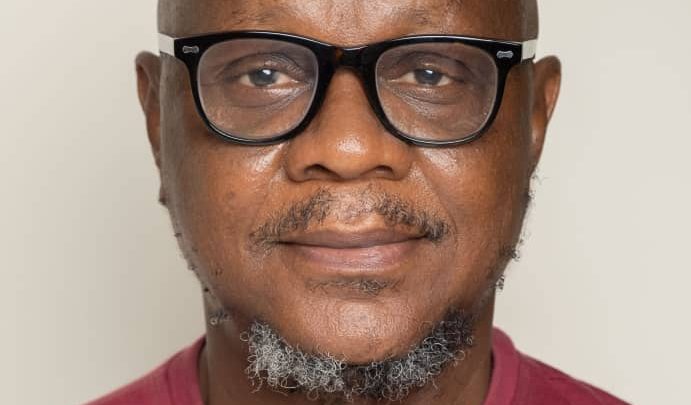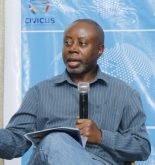By Ibanga Isine
I came upon Ayn Rand’s book, “The Fountainhead”, while researching what to write about Rufai Oseni’s on-air fight with Minister of Works David Umahi. You can look for the book and have a thrilling read yourself. That’s for those who love reading. Going through Rand’s epic book, I was struck by the parallel between Rand’s defence of individual integrity and Oseni’s defiance of traditional norms. For those tired of the same old discussions over his interviewing technique, The Fountainhead may provide a subtle philosophical perspective that illuminates not only his methods but the convictions that drive them.
Many of my colleagues and those who benefit from a system that is suffocating Nigerians and pillaging the country’s commonwealth cite age-old journalism rules and conventions to criticise Oseni. But if politicians followed the rules they cite and respected the oaths of office they take, the country would not be where it is now. Nigeria’s moral and institutional decay demands journalists who go above and beyond to expose the contradictions of those in positions of power. In that regard, Oseni’s approach is not a breach of ethics, but rather an ethical awakening for a profession that is gradually losing its potency.
Ayn Rand’s philosophy of individualism and her representation of integrity in The Fountainhead offer a useful lens through which to examine current events in Nigeria. Rand’s hero, Howard Roark, represents the creative man who refuses to compromise his principles to please others. Similarly, Rufai Oseni’s insistence on asking tough questions and demanding answers even when they upset political elites shows him as an independent thinker who challenges collective hypocrisy.
In The Fountainhead, Rand portrays the conflict between individuality and collectivism as “not in politics, but in man’s soul.” Her main character, Howard Roark, was expelled from architecture school for refusing to adapt to traditional architectural practices. He works in silence, designs according to his own idealism, and rejects public validation. Roark’s Temple of the Human Spirit is considered heretical since it celebrates man’s creative power rather than conformity to tradition. However, Rand uses this rejection to highlight how true creativity frequently evokes hatred in a society that fears originality. A society governed by mediocrity, corruption and moral dependence hates anyone who refuses to submit to them.
You can also read- Before We Cricify Rufai Oseni
Rand’s introduction to The Fountainhead’s 25th Anniversary Edition reinforces this point. She argues that the book encourages “the integrity of one’s own mind” and warns against “spiritual collectivism,” which seeks to silence anyone who does not think or act according to popular standards. Moral courage, according to Rand, is being true to one’s own reason and convictions even when the rest of the world rejects them. Rufai Oseni’s professional position reflects the moral freedom that Roark symbolises.
Nigeria’s sociopolitical landscape is deeply morally flawed. A recent World Bank estimate puts roughly 140 million Nigerians below the poverty line. In the same country, a small elite lives in luxury, largely of funded by public funds. The judiciary, anti-corruption agencies, and legislature, all of which are supposed to hold politicians accountable, are complicit and compromised. In such cases, traditional “professional” media standards frequently serve as tools for evasion. When journalists sidestep asking difficult questions and demanding answers for the sake of politeness, they contribute to a culture of impunity that impoverishes millions. This situation is comparable to Rand’s description of the social setting in The Fountainhead—a world that punishes moral independence while rewarding conformity. In the book, Ellsworth Toohey, Rand’s manipulative columnist (journalist), exemplifies this moral decay.
He preaches humility and societal responsibility while implicitly trying to destroy outstanding potential. Toohey’s motto is, “Don’t set out to demolish all shrines; you’ll frighten men. Enshrine mediocrity, and the shrines are razed,” describes the strategy used by corrupt systems to maintain control: suppress excellence under a pretence of civility (Rand, 1996, p. 397). Nigerian politicians and their followers frequently employ moral inversion to accuse critical media of being “disrespectful.” Their greatest fear is not disrespect, but exposure and the unravelling of a culture based on impunity and lies.
Rufai Oseni’s political interviews are direct, aggressive, and intellectually rigorous, reflecting Roark’s creative individualism. His style challenges Nigerian journalism’s subservient culture, in which politicians are treated as untouchable demigods rather than public servants. Oseni is accused of being rude because he refuses to romanticise power or accept evasive answers. His questions, on the other hand, come from moral conviction and the idea that the journalist’s duty is to reveal the truth, not to soothe.
Ayn Rand would have described Oseni as a man “who stands alone against the world,” precisely because he refuses to let others dictate his values. Rand’s book portrays Oseni as a rational egoist, someone who acts on his own judgment. As Roark explains to his opponents, “I don’t construct to get clients; I have clients to build” (Rand, 1996, p. 18). Oseni conducts interviews not to entertain or delight guests, but to reveal the truth, confront lies, and demand accountability. This attitude shows journalistic integrity as self-sufficient moral action and a refusal to give up one’s professional values for public acceptance.
You can also read – Buhari’s Death and the Body Double Theory
Rand’s philosophy warns against the tyranny of public validation, or the belief that an individual’s worth is defined by the approval of others. This “second-hand” perspective defines collectivist philosophy, which she describes as “the parasite of the soul.” Nigerian media criticism frequently reflects this mindset: those who insist that Oseni be “more respectful” want him to conform to societal standards imposed by the privileged class he criticises. However, in a corrupt society such as Nigeria, public endorsement may not carry any moral value. When the audience applauds dishonesty while condemning integrity, the only sensible action is defiance.
Roark’s destruction of the Cortlandt housing project in The Fountainhead exemplifies this idea. When others alter his building design to fit popular taste, he destroys it rather than have his vision perverted. His defiance shows moral ownership and the conviction that integrity is non-negotiable. Similarly, journalists such as Oseni must sometimes reject traditional civility to preserve the integrity of truth-telling. Being courteous in the face of lies constitutes complicity. Innovation in journalistic practice, whether through tone, questioning style, or intellectual rigour, must not be sacrificed to appease those who make money from public ignorance. Rand considers creativity a moral act because it shows reason and independence. Journalism should convey truth and not serve a false narrative.
In a society that has lost every ounce of moral value, it will take unconventional methods to reset the conduct of public officials and expose their atrocities. The moral decline of Nigeria’s social and political structures demands courageous journalism that deviates from archaic standards of politeness and subservience. Confrontational questioning, data-driven investigations, and moral interrogation are not signs of disrespect, but of moral renewal.
Oseni’s critics conflate civility with morality. They mistake civility for ethics, and failed to recognise that politeness without truth is hypocrisy. The journalist’s first responsibility is not to manners, but moral clarity. In confronting evasive politicians, Oseni serves the job that Rand assigns to all independent minds: to strip away deception and affirm the supremacy of reason. His method is uncomfortable precisely because it forces power to confront its own corruption.
Ayn Rand’s defence of the independent creator offers moral legitimacy for journalists such as Rufai Oseni, who push beyond traditional boundaries to challenge entrenched power systems. Conformity is not professionalism in a society ravaged by corruption, poverty, and hypocrisy; it is moral failure. Nigerian journalists must reject pressure to dilute their principles to gain societal acceptance, much as Howard Roark refused to sacrifice his vision for mediocrity.
Journalism innovation, whether in approach, questioning style, or comportment, is critical to public accountability. Those who advocate for “respectful” interviews in the face of national decay misunderstand journalism and morality. Respect in this context is owed to the people whose voices have been silenced by power, not those who abuse them. Individual integrity, not public approbation, is the standard for professional excellence. If Nigerian journalism is to restore its moral authority, it must embrace the courage of people like Rufai Oseni. As Rand would possibly say, the decision for Nigerian journalists is simple: be Howard Roark or Peter Keating—stand for truth or serve the crowd.
If media outlets in Nigeria adopted Oseni’s approach, politicians would be more cautious in their public statements. They would no longer feel safe telling obvious lies and getting away with it. Fear of being confronted with facts, evidence and moral questions would reduce the recklessness that characterises Nigerian political communication today, and force paid writers out of work. When journalists work together to raise the bar for accountability through daring questions, deception becomes costly, and the moral temperature of public life begins to rise.
Final Lines
The Calabar Coastal Highway project shows not only mismanagement but also intentional evasion of responsibility. Under Section 25 of the Public Procurement Act, every major public works contract must include a Bill of Quantities (BOQ) or a Bill of Engineering Measurement and Evaluation (BEME), which are documents that outline costs, quantities, and standards. The Bureau of Public Procurement (BPP) also requires these before issuing a No Objection Certificate, which is necessary for any valid award or payment.
It is criminal that Nigeria’s largest infrastructure project in decades started without a BOQ, BEME, or Environmental Impact Assessment (EIA). This was not an accident; it was a deliberate rejection of transparency and due process.
Ayn Rand cautioned that the “aristocracy of pull” replaces the rule of law when societies reward power above competence. Facts are ignored, truth becomes inconvenient, and corruption is institutionalised. According to Rufai Oseni, a nation that builds without plans and defies its laws would not prosper. The Calabar Coastal Road has thus become more than a project; it represents how unchecked power transforms governance into drama and development into illusion. Until Nigeria learns to measure before building and to think before acting, every major project will only pave the road to nowhere.




